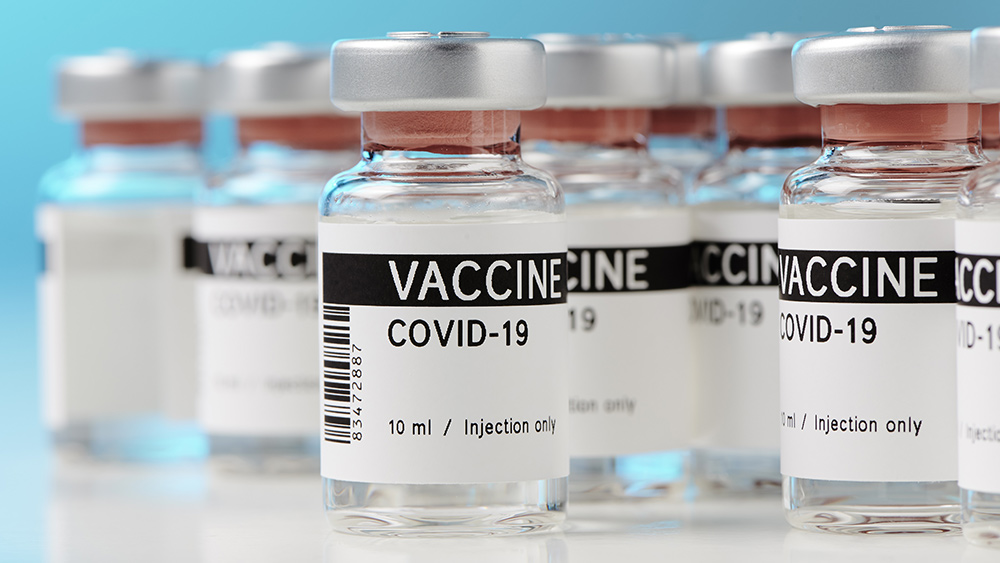Study links Moderna’s coronavirus vaccine to painful skin reactions after inoculation
03/11/2021 / By Zoey Sky

Health experts across the globe continue to claim that coronavirus (COVID-19) vaccines from several drug manufacturers are safe to use amid the ongoing pandemic.
However, a team of doctors has discovered that Moderna’s coronavirus vaccine is causing painful skin reactions in patients about 11 days after inoculation.
Moderna vaccine side effects include inflamed skin and rashes
After the shocking discovery, the team of 11 doctors penned a letter to the New England Journal of Medicine. The data was based on observations from 12 patients who reported skin reactions after receiving the Modena COVID-19 vaccine.
For the study, researchers observed the symptoms of 12 patients (out of 30,420) who developed a delayed reaction. According to the results, the reaction occurred anywhere between day four and day 11 after the patients received the first dose of the Moderna COVID-19 vaccine.
In the letter, the doctors explained that the vaccine made a small percentage of people “develop patches of inflamed skin and rashes around the injection site, up to 11 days after vaccination.”
The unusual dermatological reaction to the vaccine was observed in a dozen patients who experienced raised, itchy or painful large, red patches of skin near the injection site. Despite these alarming effects, the team of doctors insisted that the skin rashes have occurred because of a “delayed allergic immune response” that is often observed in drug reactions.
The 12 patients received treatment for the skin reactions. The experts also noted that the side effects eventually cleared up after an average of six days.
Ironically, the doctors encouraged the patients to get the second dose of the potentially harmful Moderna coronavirus vaccine. It should come as no surprise that after getting another dose of the vaccine, three patients had the same reaction.
Three patients also had a reaction of lesser severity. Data showed that 50 percent of the cohort had no reaction after getting the follow-up vaccine dose. (Related: Hundreds of Florida residents report side effects following Wuhan coronavirus vaccination.)
How the vaccine is supposed to work
According to Dr. Esther Freeman, director of Global Health Dermatology at Massachusetts General Hospital (MGH) and co-author of the letter, most of the patients experiencing skin reactions are doing so because of their own “immune system going to work.”
Dr. Erica Shenoy, a letter co-author, said that clinicians and patients shouldn’t confuse these cases of delayed cutaneous hypersensitivity with a skin infection. Shenoy warned that the skin reactions don’t require antibiotics.
Dr. Adil Sheraz, a consultant dermatologist and British Skin Foundation spokesperson, explained that adverse cutaneous or skin reactions are “quite typical for a variety of vaccines.” Sheraz noted that more recognized traditional vaccines, like the MMR (measles) vaccine, usually occur a few hours to a few days later. These vaccines can cause “tenderness, erythema (redness) and swelling at the site.”
The Moderna vaccine is an mRNA vaccine similar to the one developed by Pfizer and BioNTech. This kind of vaccine exposes a patient to messenger RNA (mRNA) or a small sample of coronavirus genetic material.
This virus sample then inserts itself into cells and tricks them into making a copy of the coronavirus spike protein. In turn, this mechanism activates your immune system so that it can learn how to protect you from the virus while fighting off its own cells with a COVID-19 disguise.
Allegedly, this mechanism is behind most of the side effects of vaccines, like the skin reactions linked to Moderna’s coronavirus jab. Big Pharma wants the public to believe that these adverse effects aren’t due to a mild case of the coronavirus, but your body’s own reaction and the immune system working.
Moderna’s COVID-19 vaccine was approved by drug regulators in America, the U.K. and EU for emergency approval. It is already being administered in the U.S. and EU while the U.K. is slated to receive its first doses of Moderna’s vaccine later in March.
Women more likely to experience side effects after receiving coronavirus vaccine
A separate study by the Centers for Disease Control and Prevention (CDC) revealed that women make up the majority of the patients experiencing negative side effects because of the COVID-19 vaccine.
In the study, almost 7,000 people reported to the CDC that they were experiencing side effects after inoculation like headaches, fatigue and dizziness – about 80 percent are women.
The survey was conducted by researchers at the CDC last February. The safety data involved over 13 million recipients of the coronavirus vaccine as of Jan. 13.
Within the span of one month, 13,794,904 COVID-19 vaccines were administered to Americans. About 61.2 percent or 8,436,863 doses were administered to women.
Shelly Kendeffy, a medical technician in State College in Pennsylvania, received the Moderna COVID-19 vaccine. According to Kendeffy, she didn’t feel any side effects immediately after getting vaccinated. But on the afternoon of the same day, she felt her teeth chattering. She was also sweating and felt “soaked, but frozen.”
Kendeffy added that six of her seven female colleagues also experienced symptoms such as body aches, chills and fatigue. Her seventh female colleague didn’t experience flu-like symptoms, but she “spent the night after [getting] the vaccine vomiting.”
Eight of Kendeffy’s male colleagues were also vaccinated. One experienced soreness, someone else suffered from a headache, two experienced fatigue and four didn’t experience any symptoms at all.
Sabra Klein, a microbiologist and immunologist at the Johns Hopkins Bloomberg School of Public Health, explained that these reported symptoms were not surprising and that “this sex difference is completely consistent with past reports of other vaccines.”
Moderna and Pfizer’s mRNA vaccines are the first to receive approval for use in humans. According to a recent study on phase 3 clinical data from Moderna’s trials, 84.2 percent of patients have reported immediate reactions around the injection site.
Meanwhile, only 0.8 percent of patients experienced a delayed reaction, wherein they developed a rash over a week after inoculation.
Follow Immunization.news for more news and information related to the coronavirus vaccines.
Sources include:
Tagged Under: 2019-nCoV, adverse reactions, Big Pharma, coronavirus vaccine, covid-19 pandemic, Moderna, novel coronavirus, Pfizer, research, Study, vaccine injury, vaccine wars, Wuhan coronavirus
RECENT NEWS & ARTICLES
COPYRIGHT © 2017 BIG PHARMA NEWS





















